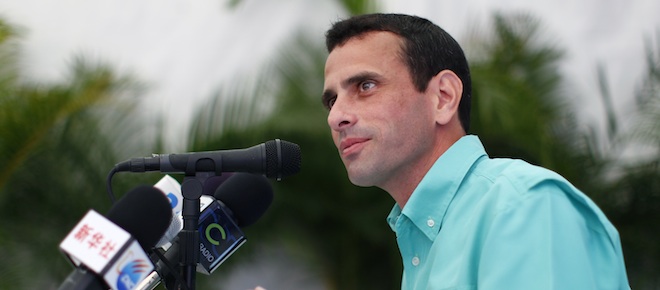Henrique Capriles Radonski: Giving Chavez a run for his petrodollars
Our Q&A with the Venezuelan presidential candidate
Opposition frontrunner presidential candidate Henrique Capriles Radonski speaks to the foreign media in Caracas February 7, 2012. The opposition coalition will determine their presidential candidate in a primary election on February 12, 2012, to choose a rival to President Hugo Chavez. REUTERS/Jorge Silva (VENEZUELA – Tags: POLITICS ELECTIONS)
Share

Henrique Capriles Radonski can be a hard man to reach. A Venezuelan state governor and the 40-year-old grandson of a Holocaust survivor, he is running to become Venezuela’s next president—for real. Surprising Venezuelans and foreign observers across the world, he is closing in on Hugo Chávez, the country’s strongman of 13 years, according to a number of opinion polls.
Capriles’ press people say he campaigns in the streets from sunup to sundown, pressing the flesh in as many pueblos as possible in the run up to the Oct. 7 elections. This makes telephone interviews difficult, they say, but it’s a necessary way of campaigning in a country where President Chávez can control the airways. In an example Capriles complains of frequently, the government can force channels to carry “cadenas,” unscheduled broadcasts that interrupt regular programing and inevitably contain pro-Chávez messages, instead of less-partisan pronouncements.
The image of the tireless Capriles campaigning pueblo-to-pueblo also contrasts sharply with that of a weakened Chávez, who recently survived a cancer scare. Still, few observers would wager against the president winning another term, given his enormous popularity with the poor and ability to tap into the proceeds of a petro-state.
The ever-busy Capriles responded to email questions from Maclean’s – answering during one of his brief breaks.
Q: How has your campaign gone so far?
A: “In two months of campaigning we’ve already toured 200 towns, and we expect to reach 300 towns before Oct. 7.
“We’re going throughout the country, door-to-door, town-to-town, listing to Venezuelans. Venezuela has stagnated because this government arrived with a lot of ideas and promises, but got sidetracked along the way. This government has abandoned Venezuelans to attend to the problems of other countries. We’re not interested in saving the planet. We’re interested in resolving the problems of Venezuelans.”
Q: What are those problems? Is the country better-off in some ways now than when President Hugo Chávez took office in 1999?
A: “This country is in the worst conditions ever in its history. It’s unjustifiable that in a country with the largest petroleum reserves on the planet, 70% of the food we eat is imported … that there are 700,000 families in extreme poverty who go to bed hungry every night … that crime costs the lives of dozens of innocent people every weekend and that the perpetrators are young people aged 14 and 27 years old who were not included in the school system and don’t have a job.
Q: What will you do differently if elected?
A: “From the first moment we’re going to tackle the topic of security with all the force of the State because it’s one of Venezuelans’ biggest worries. … This goes hand-in-hand with (having) a prison system that functions and with the guarantee of access to impartial justice.
“We will strengthen the education system. This was our calling-card in Miranda (where Capriles was governor) and will be in Venezuela because education protects against poverty. We will focus on the health system. Our intention is to decentralize the health system during the first year of management. We will strengthen the petroleum industry so that it’s a springboard that gives a boost for the development of our economy.
“We propose a better path for Venezuela … we did it in Miranda state and we’ll do it in all of Venezuela.”
Q: How fair is the election?
A: “It’s no secret that in Venezuela there is no division of powers and that many functionaries have put on blinders when looking at irregularities because they benefit from the revolution and its corruption.”
“Look, as governor of our state, Miranda, by law, I separated myself from my position before inscribing as a presidential candidate, but the president (Hugo Chávez) is not obliged by law to separate himself from his position. Separating yourself from an office is to guarantee that State resources aren’t utilized in political propaganda.
“In this same way, ‘cadenas’ are permitted, but this government additionally has distorted them to such a point that it uses them for political propaganda.”
Q: The opposition has had difficulties in past elections and been divided. What’s changed?
A: “We’ve learned from past mistakes and we’re working together to give our country a different path for progress, to get out of this stagnation. The Venezuelan opposition has grown and has matured and become stronger.
“We have showed that growth and maturity in the last few elections. In 2008, we won important mayoral and gubernatorial races. In 2010, we won 52% of the vote in the parliamentary elections. This year, we had an unprecedented process of primary elections in Venezuela to choose a unity candidate for the country.
“We form a new political generation. We’ve put Venezuelans and the country first.”
Q: Many Venezuelans have left for places such as Canada. What would you say to them?
“Starting on Oct. 7, Venezuela will be another place. Starting on that day we will give Venezuelans living abroad reasons to return home. This country needs many qualified people, a lot of manpower – people willing to bet on a better future. We need the help of all Venezuelans.”
* This interview has been translated from Spanish and edited for brevity.